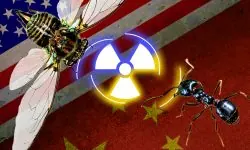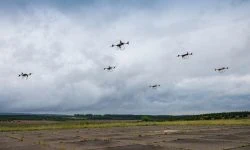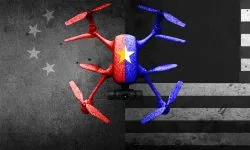The articles in this section focus directly on real world issues with geopolitical stakes.
Here you will find in-depth analyses.They are sorted out by issues presented below. You can also access our scans, i.e. information collected to identify signals, presented without analysis.
Then, we explain how we select issues and finally you can access the latest articles published.
French translations: Only recent articles are human translations. We gradually review the automatic translation (DeepL) of the remaining 600 plus articles…
>> To Think-Tank Page
Geopolitics by Issues
Access the articles in this section by chapters.

Our new initiative Climate Change, Planetary Boundaries and Geopolitical Stakes – incl. Water security, Energy security and Extreme environments (Arctic, Antarctica, Space, Deep Sea, etc.) besides Environmental Geostrategy

Pandemics – incl. the COVID-19 Pandemic

War – incl. Ukraine, The Islamic State, Syria, Libya
Photos and Art Design by Jean-Dominique Lavoix-Carli (images 1,3,6), Pixabay (2,5), various public domain (4).
Monitoring and Scanning
Our scanning and monitoring is grounded in years of practice and in-depth knowledge and experience of research for political and geopolitical issues.
Our complimentary scans are discontinued. We only provide scans on a commissioned basis.

The Sigils: a series of daily, raw (non edited) scans. Each focuses on a specific issue.

The Red Team Analysis Weekly scanned the horizon every week for weak – and less weak – signals regarding all political and geopolitical risks and uncertainties, as well as national and global changes and instability, using crowdsourcing.

Horizon Scanning Board
(demonstration sample only) – The system provides selected open source intelligence – OSINT – signals that are particularly interesting, among all the signals identified. The collection of signals provided here are a demonstration sample only.
Photos from ESO Photo Ambassadors
How we select geopolitical issues
In this section, we address the major issues our contemporary world faces. These issues may obviously be part of geopolitics, for example the crisis and conflict in Ukraine or the Islamic State and terrorism. They may also surprise you because they are not usually think about as related to geopolitics, as with the COVID-19 pandemic.
What determines if an issue must be put under watch and analysed is the impact it has on the security of polities and societies, hence the larger field of “international security”, which is more adequate as a category than geopolitics.
The issues we address may be mainstream and correspond to acute crises at one stage, or, on the contrary ignored by the media and larger public.
It is absolutely crucial to consider the issues belonging to the second category. Indeed the deeper processes run in the background, often below collective perception level, but fundamentally influence and constrain our choices. They must thus be known and explored. Furthermore, they will often lead to apparently sudden crises. If we make an analogy with volcanoes, you can imagine these deeper dynamics and issues as the earth mantle and plates, slowly changing and reorganising themselves, while this very reorganisation leads to pressure and volcanic eruption. A perfect example for this type of issues is climate change and all environmental problems.
>> To Think-Tank Page
Our latest articles
- DeepSeek vs Stargate – China’s Offensive on U.S. AI Dominance?Is China launching a strategic offensive against the dominance of the U.S. artificial intelligence (AI) and tech sector? And if this is the case, what is the meaning of this Chinese offensive? The question of a Chinese offensive on the U.S. tech and AI sector has been increasingly relevant over the last months (e.g. Foresight …
Continue reading “DeepSeek vs Stargate – China’s Offensive on U.S. AI Dominance?”
- Trump Geopolitics – 1: Trump as the AI Power President(Donald Trump with Elon Musk, Tulsi Gabbard, RFK Jr, and Mike JohnsonCredit photo: from Office of Speaker Mike Johnson – Public Domain ) President-elect Donald Trump declared that Canada should become the “51st state” of the United States of America. He also repeats quite often that the U.S. should “buy Greenland” (Alexandra Sharp, “The 51st …
Continue reading “Trump Geopolitics – 1: Trump as the AI Power President”
- Uranium for the U.S. Nuclear Renaissance – 2: Towards a global geopolitical race(Art direction and design: Jean-Dominique Lavoix-CarliPhotos credits : Didier Descouens & Egor Kamelev) The uranium requirements created by the planned American nuclear renaissance are immense and unprecedented (see Helene Lavoix, “Uranium for the U.S. Nuclear Renaissance: Meeting Unprecedented Requirements (1)“, The Red Team Analysis Society, 27 November 2024). Yet, the production of uranium in the …
Continue reading “Uranium for the U.S. Nuclear Renaissance – 2: Towards a global geopolitical race”
- The New Space Race (1) – The BRICS and Space MiningRussia, India, Japan, China, the United Arab Emirates, the U.S., the European Space agency, etc. are all sending robots on the Moon or on Mars. On 26 September 2022, the U.S. NASA purposefully projected a spacecraft on asteroid Dimorphos. Such was the precision and the force of the impact that it opened a crater in …
Continue reading “The New Space Race (1) – The BRICS and Space Mining”
- Uranium for the U.S. Nuclear Renaissance – 1: Meeting Unprecedented Requirements(Art direction and design: Jean-Dominique Lavoix-Carli) The U.S. has planned for a Nuclear Renaissance. It aims to reach 300 GWe capacity by 2050 for nuclear energy and envisions two scenarios to reach this goal (U.S. Department of Energy -DOE, Pathways to Commercial Liftoff: Advanced Nuclear, 30 September 2024). Developing the future American fleet of reactors implies …
Continue reading “Uranium for the U.S. Nuclear Renaissance – 1: Meeting Unprecedented Requirements”
- Fifth Year of Advanced Training in Early Warning Systems & Indicators – ESFSI of Tunisia(Art direction and design: Jean-Dominique Lavoix-Carli) At the end of October 2024, the Ecole Supérieure des Forces de Sécurité Intérieure (ESFSI) of the Home Ministry of Tunisia organised the first session of its fifth intensive training on early warning systems & indicators. This session ran concurrently with a crisis management module, highlighting the interconnected nature of …
- Towards a U.S. Nuclear Renaissance?(Art direction and design: Jean-Dominique Lavoix-Carli) On 30 September 2024, the U.S. Department of Energy (DOE) published the latest edition of the Pathways to Commercial Liftoff: Advanced Nuclear. Its aim is to contribute to accelerate advanced nuclear reactors’ commercial deployment in support of U.S. objectives in terms of nuclear energy, necessary notably to achieve its …
- AI at War (3) – Hyperwar in the Middle east(Image: UK MOD, OGL v1.0OGL v1.0, via Wikimedia Commons ) AI is everywhere in the current Middle East wars. In the Gaza war, triggered by the monstruous massacre inflicted by the Hamas militia on 7 October 2023, the Israel military is using machine learning in order to produce targets in Gaza ( “Octobre 7: How …
Continue reading “AI at War (3) – Hyperwar in the Middle east”
- AI at War (2) – Preparing for the US-China War?(Art direction and design: Jean-Dominique Lavoix-Carli) Darkening clouds (of drones) On 28 August 2023, on the Island of Guam, Kathleen Hicks, Deputy Secretary of Defense, gave a speech at a military and media crowd about the need for the U.S. to mass produce drones in order to outsize the Chinese People’s Liberation Army (Deputy Secretary …
Continue reading “AI at War (2) – Preparing for the US-China War?”
Join the Adventure!

A part of our research articles and analysis on global issues and geopolitical stakes are premium content, to guarantee quality. Yet, we are also striving to offer as many as possible of our articles for free (open-access).
This is only possible with YOUR voluntary support
Become a member of the Red Team Analysis Society to support independent and in-depth analysis.
Donate and contribute to fund analysis and increase the number of open-access articles














